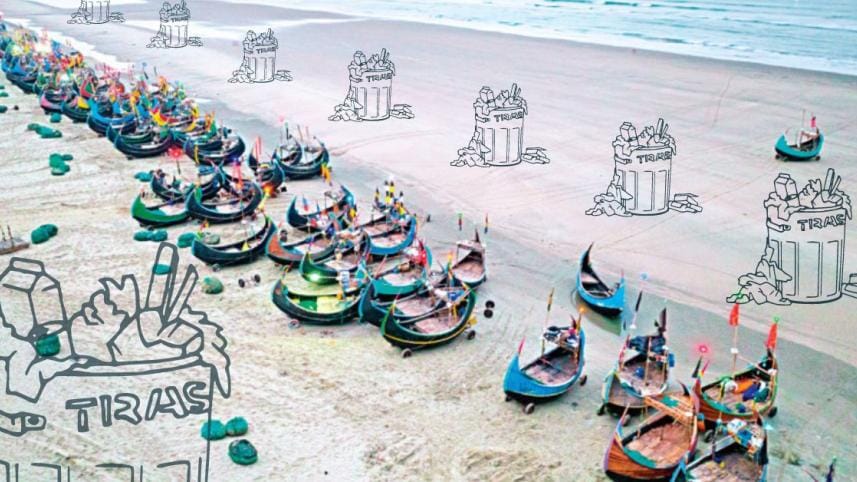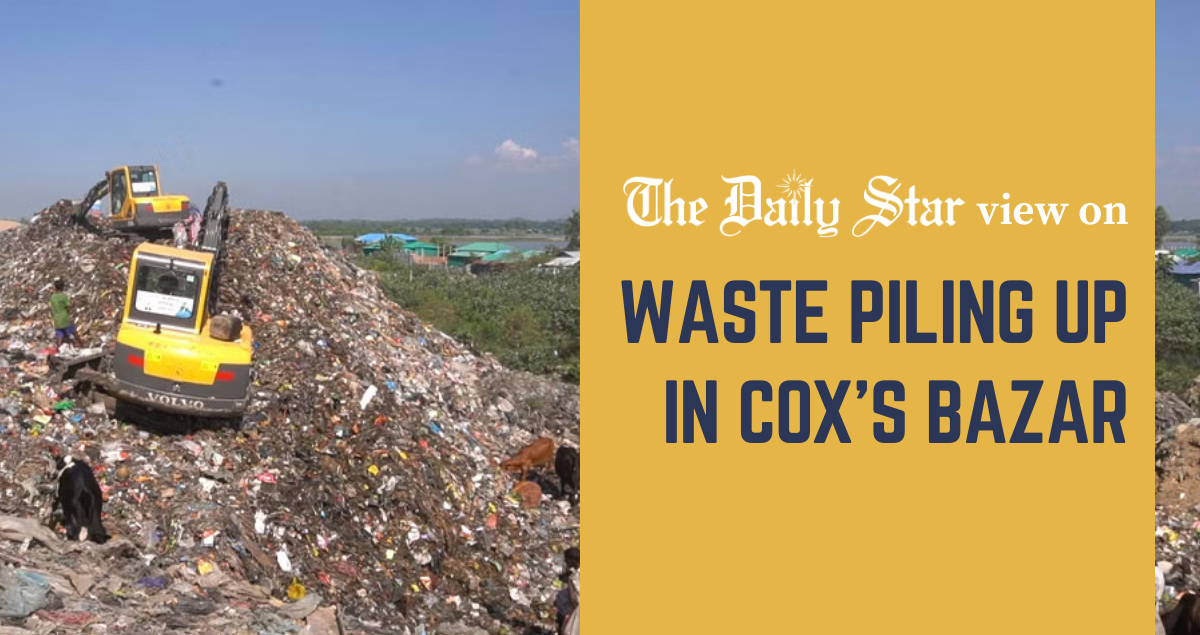Cox’s Bazar: Buried in waste

Cox's Bazar's struggle with waste mismanagement seems to have no end in sight. The tourist city, extremely popular with tourists from home and abroad, is mired nose-deep in all sorts of waste, including human effluent, aquaculture waste, plastic waste, and transboundary plastic waste.
What makes the situation worse is that it is not a new problem. This issue has been so vehemently persistent that even the High Court had to intervene in this matter in 2019 and question the inability of the government to address it, in response to a writ petition filed by the Bangladesh Environmental Lawyers Association (BELA).
The daily Prothom Alo recently reported on the unhealthy, unhygienic and irresponsible sewage management (or the lack thereof) of the city. Of the 538 hotels, motels, resorts, and cottages built in the Kalatali area next to the sea beach, 532 do not have any sewage treatment plants (STPs). The report further states that the mandatory rule of incorporating an STP system in the construction of a hotel, motel or guest house is not followed at all, as a result of which the majority of these hotels are using septic tanks to manage human waste. During peak tourist seasons as well as the monsoon, the tanks are not able to take the load of the sewage and it is spilled into the rivers and the sea, putting marine lives and local ecological balance at risk. Although the hotel, motel, and guesthouse owners are willing to contribute financially to construct a central STP system, little measure has been taken so far by the authorities to install one.
But this is just the tip of the iceberg. It has been reported earlier in the media that around 124 tonnes of waste, including plastic, are removed from Cox's Bazar city every day. In a report published in April last year, this daily pointed out the non-functional waste management system in Cox's Bazar city. While garbage keeps piling at Kasturighat landfill, there is little the authorities can do to dispose of plastic waste, as it is non-biodegradable, and it cannot be burnt either as doing so will release toxic fumes. So, without a proper waste management system, plastic keeps filling up the landfills.
Moreover, the rivers and the sea are getting clogged up by ill-managed plastic waste. Take the case of Bakkhali River, which is gasping for fresh air being choked by unwanted and irresponsible plastic waste dumping.
Then there is the problem of transboundary plastic waste coming all the way from Nepal, China, India, Myanmar, and Bhutan through the rivers, being dumped into the Bay of Bengal. Our three major rivers – Padma, Meghna, and Jamuna – carry 73,000 tonnes of plastic waste, most of which is transboundary, to the Bay of Bengal daily. Given the main arteries of our riverine system are carrying this burden, its tributaries and offshoots, including those in Cox's Bazar, have to shoulder the load.
Apart from these significant waste management challenges, there is another kind of pollutant: waste from shrimp hatcheries. Only a handful of the hatcheries there have proper STPs; the others release untreated water – full of excrement, unconsumed feed, and moulted exoskeletons shed by the fries – directly into the sea. It is understandable that investing in an ETP or STP is difficult for many small hatcheries, but a central STP system can be used by them to treat the water before releasing them into the sea. Biofiltration can also be considered as an alternative to treat polluted water from hatcheries, since most of the waste is organic.
Cox's Bazar is already ecologically vulnerable, especially in the aftermath of the clearing of more than 8,000 acers of reserved forest land to accommodate and provide for the Rohingya refugees. According to a 2019 report by the environment ministry, the damage is estimated to be around Tk 2,420 crore. While attempts are ongoing to revive the greenery of the area, the damage cannot be fully reversed, and the ecological risks will remain.
It is high time the authorities concerned took the rampant pollution and subsequent environmental disintegration of Cox's Bazar seriously. The government should strictly ban single-use plastic in the tourism hub, and fine tourists for littering and irresponsible dumping of any kind of waste. In 2021, the government had launched a three-year project to prevent the use of single-use plastic in 12 coastal districts of the country, but with little headway in actually implementing it. The project could perhaps be revived to bring about meaningful change in how plastic waste is managed in the city.
A robust communication campaign could also be run to drive behavioural change among the public. At the same time, the authorities should raise the issue of transboundary plastic pollution in various bilateral and regional forums, to address this problem at the earliest and with the cooperation of all.
A centralised STP should be set up at the earliest, with financial support from hotel, motel, restaurant owners. The authorities should also help the shrimp hatcheries in setting up a similar central water treatment facility.
While the order is tall, we cannot turn a blind eye to the rotting situation in Cox's Bazar. This city is our pride, a significant highlight of our nation's branding activities. The authorities, and we as responsible citizens, must do all we can to address this nasty menace and reclaim our pristine prize.
Tasneem Tayeb is a columnist for The Daily Star. Her Twitter handle is @tasneem_tayeb




 For all latest news, follow The Daily Star's Google News channel.
For all latest news, follow The Daily Star's Google News channel. 
Comments